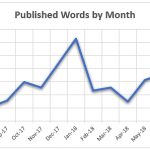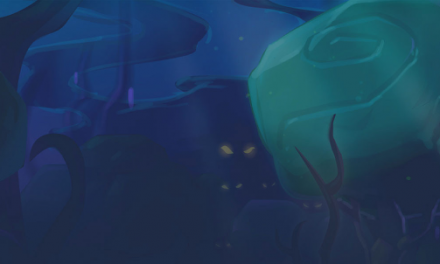Though I’ve had the PoeticsOnline.net domain name since 2003, it wasn’t until one year ago that I started seriously posting content, kicking things off with a large site redesign and blank slate on which to write. While I often wrote poetry or short stories in high school, and occasionally in college, this past year has seen a veritable explosion of creative content, as I have pursued a dedicated and determined effort to express myself through writing.
 In the past twelve months I have created and explored four long-running story arcs, approached a distributor about book publishing, and explored different ways to attract new readers. Some days and nights have been filled with prolific typing, while some weeks have seen hardly a new word added. All in all I’ve been able to maintain a relatively consistent schedule, with new content coming out every few days as I work to create and share. A question that remains unanswered is one that I’ve received several times over the past year: what I hope to “get out” of my writing.
In the past twelve months I have created and explored four long-running story arcs, approached a distributor about book publishing, and explored different ways to attract new readers. Some days and nights have been filled with prolific typing, while some weeks have seen hardly a new word added. All in all I’ve been able to maintain a relatively consistent schedule, with new content coming out every few days as I work to create and share. A question that remains unanswered is one that I’ve received several times over the past year: what I hope to “get out” of my writing.
Inspiration
Whereas once the barrier to creating readily-available art was very high, with a few select individuals or entities holding the keys to success (e.g. gallery owners or book publishers), the rapid explosion of the internet and online creative communities has made the barrier to entry incredibly low, with blogs and media-sharing sites available at the click of a mouse. I don’t think of this change as inherently good or bad, merely a function of where technology and society have lead us. People who never believed themselves to have a voice can now find respect and feedback from others on a scale never dreamed before, but alternatively there are functionally no gatekeepers, meaning content of any quality can and will be shared far and wide; self-promotion therefore becomes an increasingly powerful endeavor, to increase the odds that specific works will stand out and attract an audience.
Many of the more personal entries on this site deal with my relationships with other people, with myself, and with my creative pursuits, and how I have an admittedly poor grasp of self-worth, relying on feedback from others to gauge my apparent success or lack thereof. Though I try not to, I still pour over my site stats, seeing which blog entries are popular from week to week, which story arcs are being followed-up on. I admit that it means a lot to me when people find my work interesting, particularly when I don’t put much effort into spreading the word, myself. It’s truly exciting when I see that something has resonated with readers.
I think it would be a phenomenal mark of success to find a publisher who likes the ideas I have, and/or a recurring outlet that would want me to write for them. I looked into self-publishing, and there are a great number of opportunities for that, but I don’t think doing it myself would have the same introspective meaning or impact as someone else wanting to share my work. Realistically, what I want most is to inspire other people, to show them that the stories they want to tell are important and valuable, and that they can have their voice.
 One of my biggest inspirations for relaunching this blog last year was the success of Rachel Beck’s The Glitch Logs, the initial chapters for which she began posting on a personal website, eventually finding a significant and enthusiastic enough following that she has published the first two volumes of her continuing cyberpunk story through Amazon. From my perspective, that’s a resounding success, let alone on top of her other works. Seeing her process and how her story developed with each new post was fascinating to me, and made me realize that maybe I had stories to tell, too. I already had a website, why not put it to use?
One of my biggest inspirations for relaunching this blog last year was the success of Rachel Beck’s The Glitch Logs, the initial chapters for which she began posting on a personal website, eventually finding a significant and enthusiastic enough following that she has published the first two volumes of her continuing cyberpunk story through Amazon. From my perspective, that’s a resounding success, let alone on top of her other works. Seeing her process and how her story developed with each new post was fascinating to me, and made me realize that maybe I had stories to tell, too. I already had a website, why not put it to use?
Emergent Stories
Most of my fiction posts and long-running story arcs come from predefined settings or systems, drawn from the many years I’ve spent acting and enjoying role-playing games. To me there’s something magical about the idea of having a tale that evolves and develops as it’s being told; I couldn’t have planned the events which inspired some of the twists and turns found in my Covert Ops posts – they were wholly inspired by moments that happened while playing a particular game with friends. There’s an old saying that “no plan survives first contact with the enemy” (attributed to Helmuth Moltke the Elder) and I firmly believe that no story survives first contact with characters. What I mean to say is that while the overarching plot may remain the same, the individual scenes and stages rarely look, once completed, like what the author had first intended. Much as real people, characters have a way of growing, evolving, and changing as their story gets told, as they interact with the world around them.
With the story seeds and settings that often form the basis of my work, I try to focus on the interpersonal relationships, the individual motivations and interactions that help give rise to new situations and outcomes, beyond what I intended before I sat down to write. To me those emerging and dynamic story-lines are far more interesting than formulaic stories that progress inexorably from a clear start to clear finish. Life is all about variety, unexpected happenstance, and serendipity – those moments that couldn’t have been planned – and I generally enjoy creating stories that mirror that organized chaos. Luckily I’ve found a niche in speculative fiction where I can go a bit above and beyond the normal bounds of everyday life to explore “what if.”
Speculative Fiction
Perhaps it’s a hold-over from working in the technology field, or my love of “cyberpunk”-style media (e.g. Blade Runner, The Matrix, Tron, the Shadowrun RPG setting, Ghost in the Shell, and many others), but more often than not I find myself writing stories that take place somewhere in the not-too-distant future, often with some aspect of humanity or society upended in a way that marks the setting as unique.
As writers in all ages have done, I often use my stories and scenarios as opportunities to explore situations, circumstances, or ideas that aren’t easily approachable when speaking of the modern day. Issues of oppression, transhumanism, culture shock, crime, and other themes that could potentially ring hollow or insincere when writing as non-fiction become much more palatable (and even relatable) when couched in the trappings of “somewhere else.” An enormous number of examples can be found in post-WWII written works like 1984, Slaughterhouse Five, the Handmaid’s Tale, Neuromancer, Transmetropolitan, and others, where writers used science fiction or fantasy to explore modern societal woes.
I have fairly strong opinions when it comes to how society “should be,” and admittedly I’ve tried to keep most of my personal politics out of this blog, but I think it would be folly to try and isolate my fiction from the situations I see around me and around the world. By focusing on various near-future settings, hopefully I can explore new material and break new ground without alienating anyone.
Quo Vadimus?
First introduced to me in the final episode of the Aaron Sorkin TV show Sports Night, the phrase “quo vadimus” simply means “where are we going” and has become something of a recurring mantra for me. Obviously none of us know exactly what the future holds, and for a long while I’ve felt like I’ve been in something of a holding pattern, waiting for something to happen. Some of the stories I’ve written over the past year have made me feel genuinely good, and I hope that others in the future will continue to do so.
I have a great deal more stories to write, and adventures to explore, and am exceptionally grateful for the support and encouragement I’ve received so far from friends, family, and even strangers online who have decided to come with me on this journey. Looking at the future, my big goal is to continue writing, hopefully finding improvements to my mood and self-confidence along the way. What I ask of you is to help me spread the word about my work, by sharing posts you like or introducing others to these stories – your combined reach is far greater than mine alone!
 For the past month or so I’ve been sending out semi-regular updates about my writing, both fiction and otherwise, to a small but growing email list. It would mean a lot to me if you subscribed and kept up to date with the projects I’m working on. You can click on the icon to the right or use the signup on my main page sidebar, and I really do mean it when I say your continued interest helps me feel really good about this creative pursuit I’m undertaking.
For the past month or so I’ve been sending out semi-regular updates about my writing, both fiction and otherwise, to a small but growing email list. It would mean a lot to me if you subscribed and kept up to date with the projects I’m working on. You can click on the icon to the right or use the signup on my main page sidebar, and I really do mean it when I say your continued interest helps me feel really good about this creative pursuit I’m undertaking.
Quick Links
Thank you again to everyone who has helped me get this far, and who continue to support me into the future. It’s been a roller-coaster of a year, but a very prolific one, and I have high hopes for the content, both in volume and in quality, I’ll be producing in the months and years ahead. I’m very pleased I’ve started this journey, and I’m so very glad you’re here with me.
- Rogg’s Adventure – a young orc on a quest to find his sister comes to terms with a world much larger, and more perilous, than he expected (story arc)
- Covert Ops – the story of two American operatives working to undermine Bolivian drug cartels, exploring the mentality such a job requires, and the toll it takes (story arc)
- Iron – a mix of character background and origin story taking place in the world of Shadowrun, I really liked how this one turned out
- History Returned – a young boy wakes up with a terrible feeling, and has to decide whether to explore the darkness
- Haze – a one-off story inspired by the absurdist theatre of Sartre, Beckett, and Shepard
In addition to all of the above, and the many other works I’ve posted over the past year, everything on this site has been categorized using the tags found in the right-hand sidebar, for easy access if there’s a particular topic or category that interests you.
Thank you!
— Christopher aka Poetics














